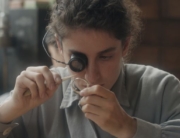In the first scene of the two-hander 10,000 km, Alex (Natalia Tena of Games of Thrones) and Sergi (David Verdaguer) are having sex in their Barcelona apartment, setting an intimate tone which the film sustains. Through their pillow talk, the audience is quickly privy to the fact that they are trying to have a baby. Both are thrilled about the idea and discuss what their child will look like as they lie in bed (he jokes that he wants six girls). While he’s in the shower, however, Alex gets an email announcing that she has received a year-long artistic residency in Los Angeles. What follows is a chronicling of a long-distance relationship, aided by technology.
After realizing she actually wants to go, Sergi panics, but he finally accepts the move because he doesn’t want to hold her back, even if it means putting their lives on pause. Alex moves into a studio in LA, and, almost immediately, things begin to change.
The new city is initially intimidating to Alex, but Sergi urges her to go out and make friends. This backfires when, after only a few months, Alex spends less time being in contact with Sergi and starts partying with new friends. Also, their attempt at Skype sex leaves Alex completely unsatisfied. One fight sends Alex into radio silence, but they work their way back to each other with the help of a slow dance via Skype, each using a laptop as a partner. To reconnect—in person—Sergi plans to spend a few months her in LA, but when she is offered a photo exhibition that would extend her stay, Sergi forces her to choose: her new life or Barcelona and a family with him.
10,000 km moves slowly, though once it establishes the rhythm of Alex and Sergi’s online communication, it picks up. At times, the film depicts the tiny moments of people keeping in touch with one another, whether that is texting or Skyping. Sergi is the more demanding one emotionally, feeling somewhat abandoned. She, on the other hand, enjoys this life change and is much more guarded about her feelings. Though it deals with big issues, the movie never overdramatizes the story, which makes Alex and Sergi feel like a real couple. Sergi even remarks how their relationship isn’t a typical movie romance, that life is “not like the movies.”
Both actors are quite natural, but it’s Tena who stands out. She effortlessly portrays Alex’s unease with the computer screen as a stand-in for her partner and her evolution from timid stranger-in-a-strange-land to confident artist. Sergi, however, is almost permanently attached to his phone or computer.
Skype dates, texts, and emails are made available for the audience to see. Debut director Carlos Marques-Marcet leaves in the realistic freezes and sound issues that come with using such technology. One particularly compelling scene is silent: Sergi writes and rewrites an apology email to Alex after a fight. The email fills the screen, and all the audience sees is the typing and retyping of Sergi’s text, as he discards one approach for another.
The theme of technology spills into Alex’s art as well, as she photographs corporate headquarters in Silicon Valley. At one point, she ponders if all of the data from their relationship could be stored at these facilities, suggesting that their history will only be found on servers and hard drives.







Leave A Comment